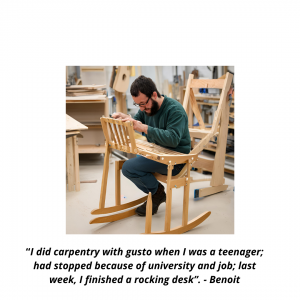A couple of weeks ago, on my way to the grocery shop, I spotted a poster about a photography exhibition at our city’s Centre de Lierre. Since it’s just a short walk from my home, I decided to stop by and was glad I did. The exhibition, running from March 7 to April 7, features the work of Michel Muller, showcasing beautiful photographs of people reading books in various settings, situations, and weather conditions. It is a wonderful reminder of how delightful it is to read outdoors, especially now that the weather is turning sunny and summer is just around the corner.

“Reading is to the mind what exercise is to the body”. – Richard Steele
Warren Buffett, the billionaire investor and philanthropist, attributes his success to his lifelong habit of reading books and newspapers. Apparently, Bill Gates, co-founder of Microsoft, reads around 50 books a year. Barack Obama, the former U.S. president, is a passionate reader and often shares his book recommendations. Oprah Winfrey is an avid reader and has created her own book club.
Reading regularly offers tremendous benefits to people from all walks of life. When we were living in Australia, I would take my son to the library for the weekly book reading sessions. His face would light up as he listened to stories, and we always left with a stack of books (the maximum allowed to borrow). I believe this sparked his imagination and fostered a love for reading, which remains with him to this day. More than 20 years later, he still carries a hardcopy of a book wherever he goes and, every year, he gives me a book as a Christmas gift.
Although I don’t buy books often, I make a point of exchanging, lending, and borrowing them regularly. Just last month, my student lent me a book written by her grandfather, which turned out to be a gem.

Her grandfather was a lawyer and reserve officer who commanded the Ligne Maginot (named after French Minister of War André Maginot), a line of concrete fortifications, obstacles, and weapon installations built by France in the 1930s to prevent a Nazi German invasion. He served there from 1939 to 1940; then, defended resistance fighters before the occupiers’ special tribunal, and also advocated for those wrongly accused as collaborators during the liberation by American and Allied forces. This personal story is set against a backdrop of fatality and heroism in places I’ve been to, including where I now live.
Sadly, even with a book like this — detailing sufferings, deaths, and tragedies — it seems those in power never learn from history. Greed, expansionism, modern-day imperialism, militarism, and the rise of totalitarianism persist, even in countries that consider themselves democracies. (Really, democracy? Perhaps anocracy – part democracy and part autocracy/dictatorship.)
Books are a uniquely portable magic. —Stephen King



